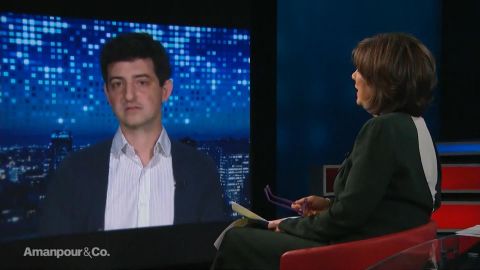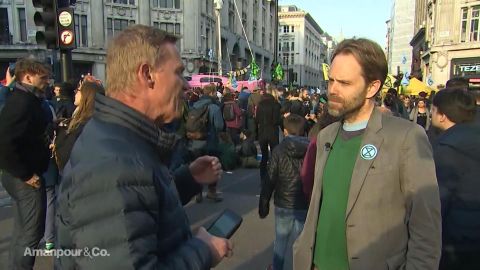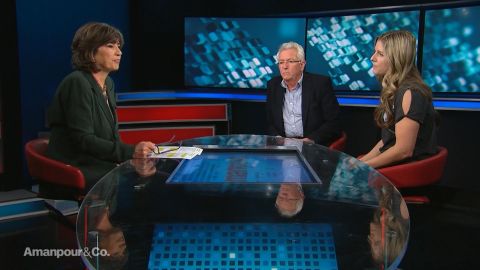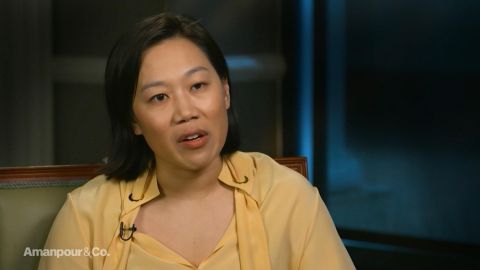Read Transcript EXPAND
CHRISTIANE AMANPOUR: Dr. Priscilla Chan is a pediatrician by trade. She’s risen to prominence though as the wife of Facebook founder Mark Zuckerberg, and together they run the Chan Zuckerberg Initiative, which aims to advance human potential and promote equality. Our Hari Sreenivasan spoke to Chan in a rare interview in San Diego, where he also asked her about her latest project, education reform and tried to get her to talk about whether Facebook should be paying more tax.
HARI SREENIVASAN: What are you announcing today?
PRISCILLA CHAN, CO-FOUNDER, “CHAN ZUCKERBERG INITIATIVE”: I’m really excited to announce a new program at University of California, San Diego and U.C. Berkeley — a program that we are borrowing from the University of Maryland, Baltimore County where we really are building in mentorship and practical advice, and good cohorts for underserved, underrepresented minority students to be able to pursue careers in the stem field.
SREENIVASAN: How does this fit with the initiatives that your foundation works in?
CHAN: At CZI, we are a big believer that we need to have diverse talent to be part of building that better future for everyone. And so we apply many tactics to ensure that we are recruiting a strong, robust, and diverse workforce. At CZI, we’re more than 50 percent women, across the organization we’re a quarter underrepresented minorities. And that’s not a nice to have, we have to have this in order to be building solutions that really meet the needs of all.
We also have a science program that allows us to really think about how to cure, prevent, and manage all disease in the next century. And having diversity of opinions, and ideas, and backgrounds is incredibly important because we need to bring fresh ideas, bring fresh perspectives and skill sets in to doing that, because if we just use the same set of tools and solutions we’re not going to be able to see those breakthroughs. We also have an educational program, we’re taking equity lends at how we really make sure that we are educating and opening up opportunities for all. An individual with a stem degree makes 26 percent more than an individual without a stem degree. And so we really see this as a pathway to opportunity.
SREENIVASAN: You’re not the first to tackle education reform, this is a tough problem to crack — so how do you think you’re going to be able to do it where — in a specific way, where others have been daunted by this challenge?
CHAN: We don’t think we’re going to be the only ones to solve this challenge, and we don’t want to be. We really think about how can we enhance what’s already great and happening in the field and spread that to more? And so what I’m really talking about is like, my experience of having mentors. I kind of think of them as heroes, you needed heroes to be able to unlock opportunity when you are in a minority group or you don’t know what’s possible. And we can’t rely on heroes, we can’t rely on luck. So how can we actually like look at these shining examples of what’s happening — of great education, great mentorship. and build tools so that others can do it in a high-quality, sustainable way so that we’re not really relying on luck but we’re actually building systems for others to access opportunity.
SREENIVASAN: So what is the Summit Learning Platform?
CHAN: The Summit Learning Platform is a software and professional development program that we’ve developed in partnership with the Summit Public Schools. It really is a three-part program – project-based learning, teaching kids life-long learning skills, and also mentorship. And what we’ve been able to do is take the success of Summit Public Schools and build a software that empowers teachers to better do those things and share them with other schools freely.
SREENIVASAN: So give me an example of how it works.
CHAN: A school would have their students be able to have a year in review and say these are the topics in English, Science, Math that you need to cover in a year and here are the habits of success. You need to be able to lay out a project plan, track your progress against it, how to ask for help. So it’s got two dimensions – both the academic and the cognitive skills –
SREENIVASAN: Yes.
CHAN: – of learning, and then they take those skills – those skills and those learnings and apply them to projects. How does your project – how does your learning actually live in the world? And so, someone might do a journalism project or visit and understand a local zoo, and to really bring that learning to life, give students the understanding of why something is important.
SREENIVASAN: You know, it’s – one of the concerns when large organizations try to tackle education is, hey, this might be an experiment for you, but this is my kid’s education that you’re playing with, right? You might take a key learning from this, but did my sixth grader or fifth grader fall behind or not meet certain expectations that they should have gotten by the end of this program, right?
CHAN: We partner with Summit to make sure that the curriculum provided is standards aligned and vetted by academics across the field. And so, we – of course that’s something we believe in and we want to make sure that we deliver not just what is expected but outsize results. In Pasadena, Texas, the students who were furthest behind actually had a 17 percentage gain in their reading and a 20 percentage gain in math. That’s incredible. We want to be able to see that type of outcome from strong implementations for students nationwide.
SREENIVASAN: How much of this informed by your own background as an Asian- American child of immigrants?
CHAN: I’m a child of Chinese and Vietnamese refugees who came to this country with very little English and very little assets. And what my family was able to do was actually take advantage of the great public schools systems that we had in Massachusetts, and I had two incredible mentors that told me about college, told me that that I would someone who would do great in college, but I needed that mentorship because as a first generation to college my family wasn’t able to provide that for me. But having someone who told me about what the practical steps were – take the SATs, take this class – but also the inspiration of you can do this, you belong here is what made I possible for me to reach Harvard as a first generation student. And for so many more students when I look to the right of me and the left of me in high school, they should have been there, too, but we often miss the opportunity to unlock potential when we don’t give students the right amount of access, mentorship, and opportunity.
SREENIVASAN: Let’s talk a little bit about science. What’s the Cell Atlas? What are you hoping to do with it? What is it and what kind of discoveries are you hoping that it leads to?
CHAN: I’m so excited about the Cell Atlas. So believe it or not, no one actually knows how many cells are in your body, what they are doing, what they look like when they’re healthy or sick. And so, by understanding that we can actually understand how your body works, what happens when you’re sick, and how to take care of it when things go wrong. And I’ll give you two really exciting examples. I’m a pediatrician. I’ve taken care of lots of kids with cystic fibrosis. We always thought that they were these two cell types involved and it was a certain channel in the lung that caused cystic fibrosis. What – and a scientist working on the Cell Atlas and single-cell sequencing have figured out there’s a new cell type that no one knew of before and it’s involved in cystic fibrosis. So we – there’s still lots to be worked out about the mechanism and if we can take an advantage of it to actually treat kids with cystic fibrosis, but that’s thrilling. Another exciting example of how you’d apply the science of Human Cell Atlas is in chemotherapies or any drug actually. Right now, there are many chemotherapies that have horrible side effects because they’re nonspecific, but what a researcher at the Biohub realized is that for a certain pancreatic cancer, it was a certain receptor on the cancer cells. CD44 that was what we needed to target. And the drugs that previously treated that cancer had horrible side effects. You would lose all of your skin. We need to redesign those chemotherapies to just target that receptor to significantly reduce the side effects. So this Human Cell Atlas, it’s going to be really exciting because it’s going to be an open resource for scientists to build upon the knowledge of others for biotechnologies to actually build useful tools, for pharmaceuticals to build medications that better treat human disease.
SREENIVASAN: In your interest in kind of criminal justice reform, that is an inherently political process meaning we collectively decide what’s good, what’s bad, what is reform, what’s our debt to society. So does that mean you end up lobbying or advocating on behalf of legislation?
CHAN: So CZI’s a political organization. We are excited about criminal justice because there are folks on both sides of the aisle that are excited about improving the criminal justice system. The way we actually engage is through a two-prong strategy. One, we work with prosecutors. Right now, prosecutors hold and enormous amount of power in the criminal justice system. It is a decentralized system that allows prosecutors, many of whom are elected, to apply the law at their discretion. And the thing that is disappointing is that there’s actually no feedback loop. Prosecutors often don’t know when they make a certain decision if it actually improves the outcome for an individual and if it makes the community safer.
So we’re working with prosecutors to better understand how they can improve their decision-making process. And the other side of this is really giving people a second chance. We – we’re part of the clean slate effort. How do we allow individuals who have served their time to actually have an opportunity at redemption afterwards? Right now, records stay on indefinitely. It affects housing opportunities, if affects job opportunities, educational opportunities, but how can we as a system really allow people to have these records cleared automatically to open doors to them that they deserve? And this is incredibly important to us because one in two Americans have a family member that’s been incarcerated. That means one in two individuals in this country are affected by these decisions that are being made by prosecutors and the opportunities that are available to people after they serve their time.
SREENIVASAN: How tied to the success of Facebook is CZI meaning what happens if Facebook doesn’t work out? Does the money and the push behind all the initiatives that CZI is making, do those stop, too?
CHAN: CZI is funded by our family’s assets in Facebook, but they belong to CZI. And so, we are managing the funds so that CZI can continue on for as long as we have the resources.
SREENIVASAN: If CZI continues, your best case scenario is that you change the world, et cetera. If Facebook doesn’t do well and these things would be hampered, you’re saying they’re completely separate and CZI’s work would continue?
CHAN: We’re managing the funds at CZI to protect our work going forward. We are always making sure that we have enough – we understand how much runway we have –
SREENIVASAN: Right.
CHAN: – and we’re very comfortable with the runway we have right now.
SREENIVASAN: One of the concerns is that I know that you don’t run Facebook and this is not – I know you’re not in the operations of Facebook, but since CZI has been capitalized with the success from Facebook, the concern is that, you know, Facebook sometimes is making money from communities that its working in in a way that might be normal for corporations but doesn’t seem almost moral, meaning why park yourself in kind of tax havens? Wouldn’t it be better for communities that you’re working in if Facebook just paid more taxes? It’d be less work for CZI to do if schools were better funded.
CHAN: So I don’t think for those who can afford it that higher taxes are a bad thing. We would be supportive of that and we do believe in making sure that community schools are well-funded. And so, I think it’s really about making sure that both the government’s advocating to make sure the government systems are well-funded because those are so much larger than any single philanthropy. And that’s why we really think about how we engage on the advocacy level to ensure that those things are true, while looking at the incredible opportunity that we have to fill in a specific niche in these spaces.
SREENIVASAN: So what I’m saying is, if Facebook paid let’s say $6 billion more in taxes, wouldn’t that eventually come in to school districts, and fire departments and so forth? And so that would actually be better for communities, it would be less work CZI to have to pick up and do, right?
CHAN: That’s not — the way schools in California are funded don’t actually quite work that way —
SREENIVASAN: Yeah, yeah —
CHAN: And so in theory that all sounds right, but that’s not actually how schools get their funding. So we need to make sure that we are really ensuring that the institutions that we care about — the NIH school districts are getting the right funding they need to do the important work.
SREENIVASAN: So you know, one of our previous guests (Inaudible), I remember him — he had a book out for a while, and one of his premises is the world would be better off, existentially if you and your husband, or other billionaires had less not more. And even more specifically had less say in, whether it’s health or in education — what do you say to that?
CHAN: I think that we as a society should really think about making sure that we are taxing those who can afford it. And I think that is a great opportunity to ensure that our public systems are well funded. But for those who want to give back, and we should be really thoughtful about ensuring that we aren’t a single voice. That as a foundation, as a philanthropy CZI should be listening to the voices of scientists, of teachers, of advocates on the frontlines and saying, “what do you need? What do you need to actually build a better system, do better work?” And actually supporting that work is something that we’re incredibly proud of doing.
SREENIVASAN: As a mom, how much digital technology is in your house? Like, how much — how comfortable are you with your kids and screen time?
CHAN: I think screen time is a fascinating question. Because right now we lump it as like screen any one minute is bad, or equivilant. But I think it’s — we need to be more thoughtful about how we think about it. Like, we have the girls video conference, video call with their grandparents all the time. And I think that’s a fantastic thing. I think very few people would argue that little kids connecting with their grandparents across the country is a bad use of their time. But we don’t park them in front of the T.V. for hours at a time, we think that’s bad screen time. And so we are very thoughtful about when we introduce technology and why, to make sure that the kids are getting a balance of different inputs, and access to learning that they otherwise wouldn’t have had.
SREENIVASAN: Will they get Facebook accounts, and if so what age?
CHAN: Thirteen, and yes.
SREENIVASAN: Did having children change how you and Mark thought about the platform and your responsibilities?
CHAN: I built my career around service. Before I met Mark, before I went to college — I knew that I had access to an incredible opportunity, it was my job to give back. I never knew that I would have an opportunity this large to give back. And so it was always in our conversations that we were going to do this, but it always felt like we should do it in the future. But when we were pregnant with Max, we realized, “oh my goodness, the future’s coming any minute,” and if we wanted our children to be a part of a future better than what we lived, we needed to make sure we were doing our part. And so that’s what gave us the — I don’t know, kick in the bottom to actually do it. When we had a newborn, and we’re glad we’re doing it, because there’s so much to learn, we’ve already come so far in the past three years and this is going to be a lifelong effort of making sure that we’re giving back with the incredible opportunity we’ve had.
SREENIVASAN: Now as a fellow Asian, I’ve got to ask this — is — are your parents more proud of the CZI work you’re doing, or that you’re a doctor?
CHAN: They’re — my mom, is so — are you a real doctor yet? Like, when I graduated medical school, does this mean you’re a doctor? When I was in residency, does this mean you’re a doctor? And then when I started tending (ph) — are you a doctor now? And so, I would say they are incredibly proud of the work we’re doing at CZI, but I think they are just so happy that my sisters and I have been able to build our careers and lives here.
SREENIVASAN: Priscilla Chan, thanks so much for your time.
CHAN: Thank you.
About This Episode EXPAND
Christiane Amanpour speaks with Keith Scholey and Sophie Lanfear about the new show “Our Planet;” Michael Holmes and Rupert Read about protests in London; and Nathaniel Rich about the Republican Party’s climate denialism. Hari Sreenivasan speaks with Priscilla Chan about her latest projects, education reform, and paying more tax.
LEARN MORE



